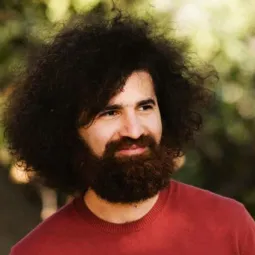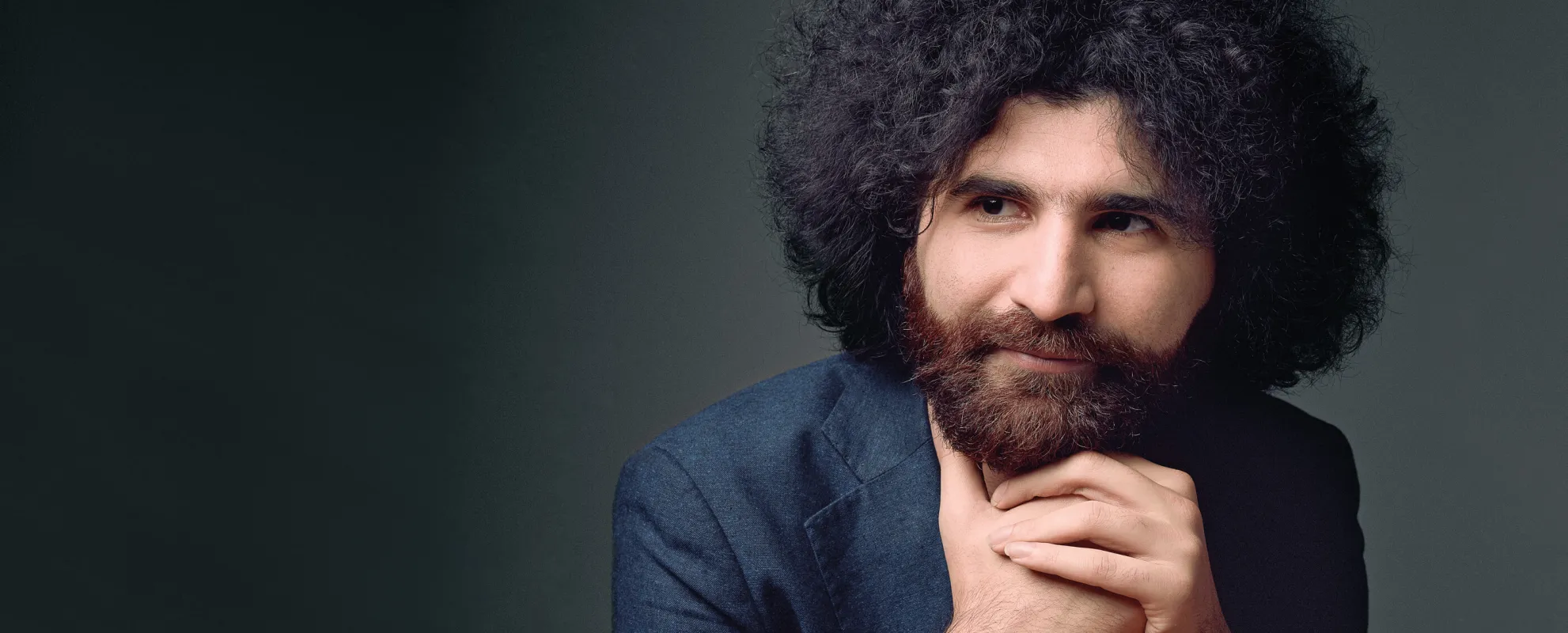As much as he liked the mathematics of electrical engineering, Mohammad Akbarpour found his undergraduate major unsatisfying. The equations were based on circuits; they had nothing to do with people. “I wanted to do mathematics that modeled human behavior,” he says.
Akbarpour explored other options at Sharif University of Technology in Tehran, Iran. He enrolled in logic and philosophy classes. He studied computational biology. But it was ultimately a few charismatic economists who drew him in, and Akbarpour was soon pursuing his PhD in economics at Stanford University. After a one-year research fellowship at the University of Chicago, he returned to Palo Alto as an assistant professor at Stanford Graduate School of Business, where he is also the Philip F. Maritz Faculty Scholar for 2018–19.
Akbarpour’s work today is defined broadly by questions of market design and network theory, but within these fields he investigates subjects as disparate as information diffusion and access to kidneys — “anything that wakes me up at night,” he says. “Whatever you study, it has to be something you enjoy on a day-to-day basis, because you’re going to be working on it for years.”
In a recent conversation, Akbarpour discussed kidneys, wealth inequality, and the most rewarding thing he has done so far in life.
More Kidneys, Less Inequality
In his second year of graduate school, Akbarpour took a class with Alvin Roth, a Nobel laureate who has worked extensively on kidney exchanges, nonmonetary markets in which transplants are coordinated between several donors and recipients. Akbarpour was enchanted with the math, and as he and his classmates Shengwu Li and Shayan Oveis Gharan looked further into it, they noticed a major shortcoming: The algorithm that matched donors and recipients tended to consider these pairs as a static given. “But they evolve over time,” Akbarpour says. “The fact that the pool of patient-donor pairs changes is an important factor that algorithms should consider.”
He focused his dissertation on the design of such an algorithm, improving the efficiency of matches. Li has since become an invaluable collaborator and someone Akbarpour credits with making him a better economist. “I learn so much from all my coauthors,” says Akbarpour, “and working with Shengwu in particular is research at its best.”
After receiving his PhD from Stanford, Akbarpour spent 15 months at the University of Chicago’s Becker Friedman Institute for Research in Economics. There, he started “thinking about new ideas,” he says, moving beyond the relatively narrow focus of his dissertation and studying larger, perennial economic problems, with a focus on wealth inequality.
In part, this was the result of attending multiple conferences on inequality that the university hosted the year of his fellowship. But Akbarpour was also driven by personal exposure. Growing up in one of the poorest towns in Iran, he saw firsthand the opportunities that are either opened or foreclosed by economic circumstance. And yet much of standard microeconomic theory doesn’t account for distinct economic circumstances: In most models, $10 means the same thing to everybody, even though $10 in fact means two very different things to someone like Warren Buffett and the average American.
Akbarpour has incorporated the nuances of inequality into a number of research pursuits. One recent paper with Winnie van Dijk of the University of Chicago examines the systems via which school districts assign students to the most desirable public schools. “A vast majority of papers that focus on school choice ignore the fact that some kids have access to private schools and some don’t,” he says. This oversight, the two researchers found, can lead to situations in which lotteries for public school seats inadvertently favor students with access to private schools.
In another recent paper, Akbarpour, Scott Duke Kominers of Harvard, and Piotr Dworczak of Northwestern examine how incorporating inequality into microeconomic models inverts some insights from classical economics. Markets, Akbarpour explains, select for those who have the highest willingness to pay for a good, not those who may need it the most. Building on this, Akbarpour and his coauthors argue that when inequality is high, market pricing may not be the optimal way to allocate scarce resources. “We need to rethink market design to fit a world in which there is persistent inequality.”
Fusing Theory and Practice
This push to crack practical problems infuses much of his work, a fact that he attributes to the people he has studied under and spent time with. Economists at Stanford and the University of Chicago, he says, generally pay attention to the ways in which their work fits into the world around them.
“He is an extraordinary visionary,” says Harvard’s Kominers. “He has forced many different areas of the field to re-understand the foundations of what they’re doing and how they translate into the real world.”
There is also a moral component to his commitment to real problems. When Akbarpour first started working on the kidney exchange, for instance, he was struck by a simple fact: Although the challenge itself — a “matching problem” — was not necessarily harder than problems faced by companies like Uber, the kidney exchanges couldn’t afford to hire several economists to help them solve it. Universities can, and perhaps ought to, play a role in bridging such divides, he says. “Academia can help charitable and government institutions be as good as Uber with their matching algorithms.”
Teaching Millions
In 2012, this moral dimension was absent from Akbarpour’s life as a new PhD student. He and four of his close friends, who had all attended high school, college, or graduate school together, were feeling unsatisfied with their influence beyond Stanford’s manicured campus. Then Salman Khan, the founder of Khan Academy, presented at Stanford GSB.
After watching Khan’s talk, Akbarpour and his friends built KelaseDars, also known as KhanacademyFarsi, to which Akbarpour has now contributed more than 280 videos on subjects ranging from high school Newtonian physics to college-level game theory. The website as a whole has delivered more than 5 million free lessons to Farsi speakers who would otherwise not have access to a high-quality education. Many of them live in Afghanistan and Iran.
Developing the project was a labor of love, part-time and unpaid for the first six months, full-time and unpaid for the following six months. PhDs went neglected. Other friends chipped in to help design and host the site. It was hectic and hard, “but it was a beautiful experience with a magnificent team,” Akbarpour says. “KelaseDars is the most meaningful thing I’ve done with my life.”
The Importance of Changing Your Mind
Though his work covers a range of subjects, choosing a favorite paper, says Akbarpour, would be like choosing between children: “Eventually parents may have a favorite, but they shouldn’t say that publicly.”
That was his response — diplomatic deferral — to the question of whether he thought that any of his work ranked above the rest in terms of quality or influence. He did, however, happily discuss a paper he wrote with two colleagues, Suraj Malladi and Amin Saberi, on the way in which information spreads through networks. Conventional wisdom has maintained that spreading an idea or product as quickly and widely as possible requires introducing it to central nodes, or influencers, in a network. “This seems like a no-brainer,” Akbarpour says.
They found instead that, for a frequently studied diffusion process, introducing the information randomly, and to a few extra people, generally leads to better outcomes. “I’m quite proud of that paper in the sense that, before and after writing it, I had very different perspectives on the economic and mathematical phenomena.”
This, he says, is the criterion he tends to use when thinking about his work: Did it alter the way he thinks about a topic? In some ways, he notes, all of academia hinges on this receptiveness to having your mind changed — whether through the people you talk to or the articles you read or the students you teach and collaborate with.
And that shuffling of ideas, says Akbarpour, is what excites him every day. “There are always unknowns in the galaxy,” he says, “and research allows you in some cases to be the first person to discover them. It may happen rarely, but it’s a marvelous feeling when it does.”
Photos by David Elliott


